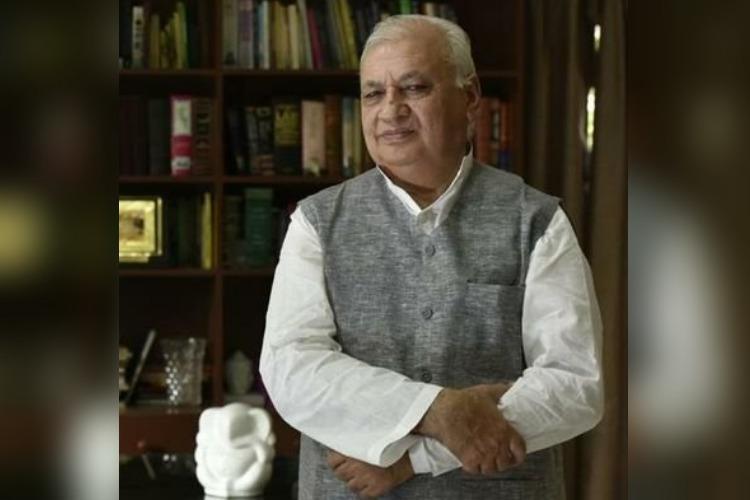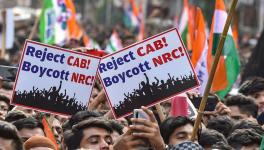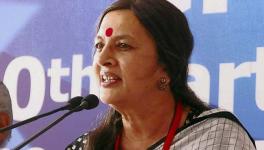Political Tussle Between Kerala Government and Governor Heats Up

Image Courtesy: The News Minute
New Delhi: The face-off between the Left Democratic Front (LDF) in Kerala and the Governor Arif Mohammed Khan over the Citizenship Amendment Act (CAA), 2019, has intensified, after the latter declared that he would seek a report from the government for approaching the Supreme Court without informing him. The state government had on January 13 moved the Supreme Court challenging the Act, pleading that it violated the Constitution of India.
“Wherever I see there is any violation, wherever, they are departing from the rule, from the provisions of the Constitution, there is no way I shall not ask for a report,” Khan told the reporters in Delhi on Friday, adding that “I have no issue with them (government) going to the Supreme Court, but they should have informed me first. I, the constitutional head, come to know about it through newspapers... I am not just a rubber stamp. This is breach of protocol and breach of courtesy...”
Khan’s comments came after chief minister Pinarayi Vijayan’s remarks in a rally to ‘Save the Constitution’ on Thursday, hitting back at the Governor for questioning the authority of the state Assembly.
“In the past, there were residents (British) above local kings. It is better to remember that now there are no such residents above the state Assembly. There are persons who have asked whether the Assembly has the power to pass resolution (against CAA). From where the Assembly got that power... To all of them, with humility, I have one thing to say... the state Assembly has that power... That big book. The oath (of office) was recited by placing a hand on that. Read that book (constitution), then you will get all the answers,” Vijayan said.
During the rally, chief minister reiterated his stand that CAA and National Register of Citizens (NRC) would not be implemented in Kerala.
It seems that the Governor has been irked from the time when he state Assembly passed a resolution against CAA, backed by the Opposition United Democratic Front. The ruling LDF-led by Communist Party of India (Marxist) and UDF-led Congress stood together against CAA.
Following Kerala, the Congress-ruled Punjab Assembly also passed a resolution against CAA on Friday and many states including Kerala, Punjab, West Bengal, Maharashtra, Jharkhand, Chhattisgarh, Madhya Pradesh, Delhi, Rajasthan, Bihar have declared that they would not implement NRC and National Population Register (NPR).
Since the Governor said that the act of the state government was against the rules of business, let’s see what the Supreme Court had said regarding the role and responsibility of the Governor while pronouncing the judgement over Nabam Rebia case of 2016.
The facts of the case were that there was a constitutional crisis in Arunachal Pradesh when 33 members of the Assembly rebelled against then chief minister Nabam Tuki. Then the Speaker Nabam Rebia disqualified the rebel MLAs on the basis of the anti-defection law before the Assembly could meet.
The Governor, however, preponed the Assembly without consulting the chief minister and council of ministers and impeached the Speaker. Then one rebel MLA was appointed as the Speaker and he cancelled the disqualification order of rebel MLAs.
While pronouncing the judgement, a five-judge constitution bench held that the Arunachal Governor’s act was violative of Article 163, which says that the “Governor of a state shall act on the assistance and advice of the Council of Ministers unless the Constitution requires him to act at his discretion.” Referring to Article 163, court observed that the Governor does not have wide discretionary powers and is always restricted by the Constitution framework.
“It is apparent from the discussion and reflection recorded by us, that a Governor of a State, has clearly defined duties, functions and responsibilities. The parameters of the Governor’s powers with reference to Articles 163, 174, 175, 179 and the Tenth Schedule, have been dealt with by us hereinabove, and need not be repeated. We are of the view, that it needs to be asserted as a constitutional determination, that it is not within the realm of the Governor to embroil himself in any political thicket. The Governor must remain aloof from any disagreement, discord, disharmony, discontent or dissension, within individual political parties. The activities within a political party, confirming turbulence, or unrest within its ranks, are beyond the concern of the Governor. The Governor must keep clear of any political horse- trading, and even unsavoury political manipulations, irrespective of the degree of their ethical repulsiveness,” reads the judgement.
While Advocate MB Rajesh, a former parliamentarian from CPI(M), in a discussion said that the government had not had any rigid decision that they would not inform the government regarding its decision to approach the court. “As per the Rules of Business, when an original suit is filed in Supreme Court, it is not necessary to inform the Governor,” said Rajesh.
Referring to the state government’s move to approach apex court against CAA, Rajesh said “This original suit is submitted in Supreme Court questioning the constitutional validity of a law.”
Get the latest reports & analysis with people's perspective on Protests, movements & deep analytical videos, discussions of the current affairs in your Telegram app. Subscribe to NewsClick's Telegram channel & get Real-Time updates on stories, as they get published on our website.
























